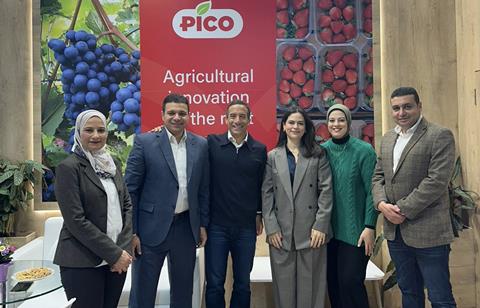The Egyptian grower-exporter is optimistic concerning new premium grape varieties’ ability to extend the season, while blueberries and exotics continue to expand Pico’s portfolio

Following a decent stonefruit season in Egypt, grower-exporter Pico’s attention swiftly moved on to grapes, as promising early varieties hit the ground in good condition, according to regional sales manager Muhammad Fayed.
“Egyptian table grapes got off to a good start this year, with harvesting starting early and shipments reaching our European markets in good condition,” he told Fruitnet.
“We started in the second week of May, a few days earlier than usual,” he explained. “The early white seedless and red seedless varieties look fantastic. Fertility, productivity and quality across early, mid and late varieties are all promising.”
Shipping routes into London Gateway and Rotterdam have been running smoothly so far, he reported, despite isolated reports of congestion. “Containers might be delayed by a day in some cases, but the early arrivals in the UK and EU have looked very good,” said Fayed.
Pico continues to trial new grape varieties, and the company’s regional sales manager for UK and Europe, Nevine Rasoul, highlighted Sun World’s early red seedless variety as one that has shown promise in its first semi-commercial season. “It requires relatively low labour inputs and the production team is happy with its performance,” she said.
Bloom’s mid-season red seedless variety is performing well, and Pico plans to scale up volumes of late-season premium lines from Bloom and Sun World. Rasoul said the company was actively working to replace older early-season varieties with newer options that are more suited to modern production and market needs.
“We’re not expanding the footprint of our older varieties, but we are still developing new options,” she said. “The late season is where we see the most potential for premium varieties.”
With distant markets growing, including in East Asia, Pico is increasingly focused on varieties that can withstand longer transit times. “Right now, we can’t risk exporting early-season grapes by sea to places like Singapore or South Africa because of transit uncertainty and Red Sea disruptions,” said Rasoul. “That’s why premium late-season grapes, which travel better, are so important to us.”
Navigating trade uncertainty
Fayed noted that the European market has so far absorbed Egyptian grapes well, despite lingering Chilean and Indian volumes in the early part of the season. “The Indian season ended on a high, which helps us,” he said. “Moving from good Indian grapes to good Egyptian grapes is a smoother transition than switching from low quality to high.”
Trade friction between the EU and UK remains on the radar, but Pico is confident its compliance with European standards will insulate it from most disruption.
“We already meet EU requirements, so for now, the alignment talk hasn’t impacted us,” said Fayed. “That said, global trade patterns are shifting. What happens in North America could still have a domino effect on the UK and EU.”
Beyond grapes
Pico is also expanding its footprint in other crops, including blueberries, mangoes and avocados. “Blueberries are still relatively new in Egypt, but it’s a very promising crop,” said Fayed. “It’s expensive to develop, but we and many other growers are investing in it heavily.”
Mangoes, meanwhile, remain a big opportunity. “We’re expanding both our export and domestic distribution of mangoes,” he explained. “We’ve invested in packing and ripening stations so we can serve both ready-to-eat and ripen-at-home markets.”
The UK could soon see a broader range of Egyptian mango varieties in retail, including traditional domestic favourites. “Marks & Spencer, for example, is looking at premium Egyptian varieties in dedicated packaging,” said Fayed. “We’re hopeful we can introduce more of these to the UK this year.”
Avocados are another crop in Pico’s strategic sights. “We’re replacing some of our older plantations with Hass, and in three years we expect avocados to be one of our biggest crops,” he revealed. “The Egyptian window works well for exports to Europe and the Middle East.”
On the home front, Pico is growing its local presence through an expanding e-commerce platform and distribution network. “We’re increasing the number of products and outlets available in Egypt,” said Fayed. “It’s an important part of our long-term growth plan.”



